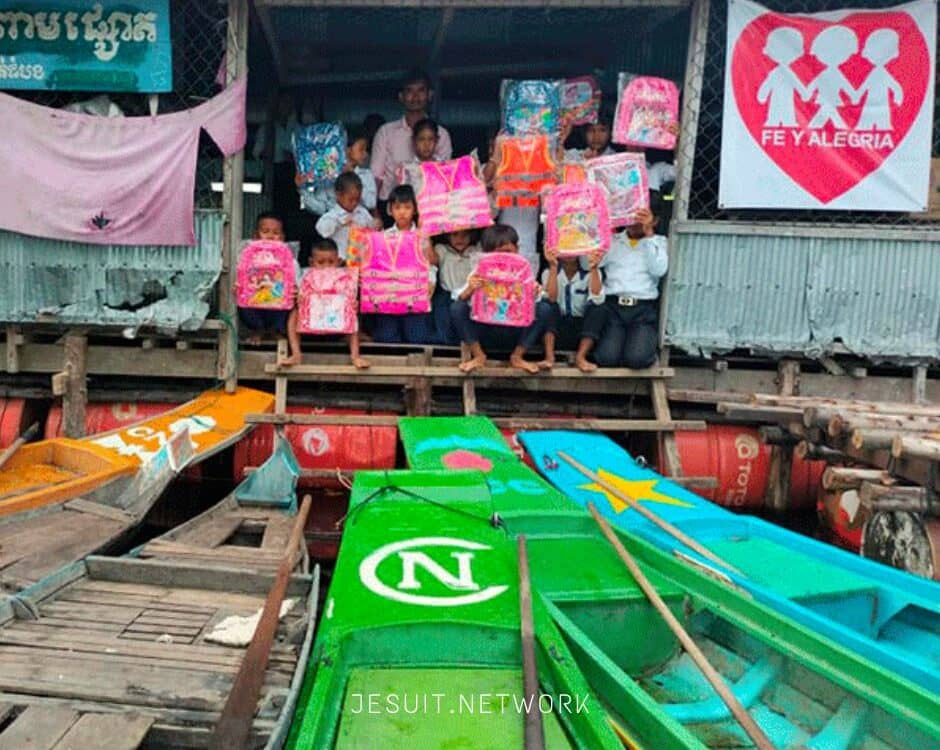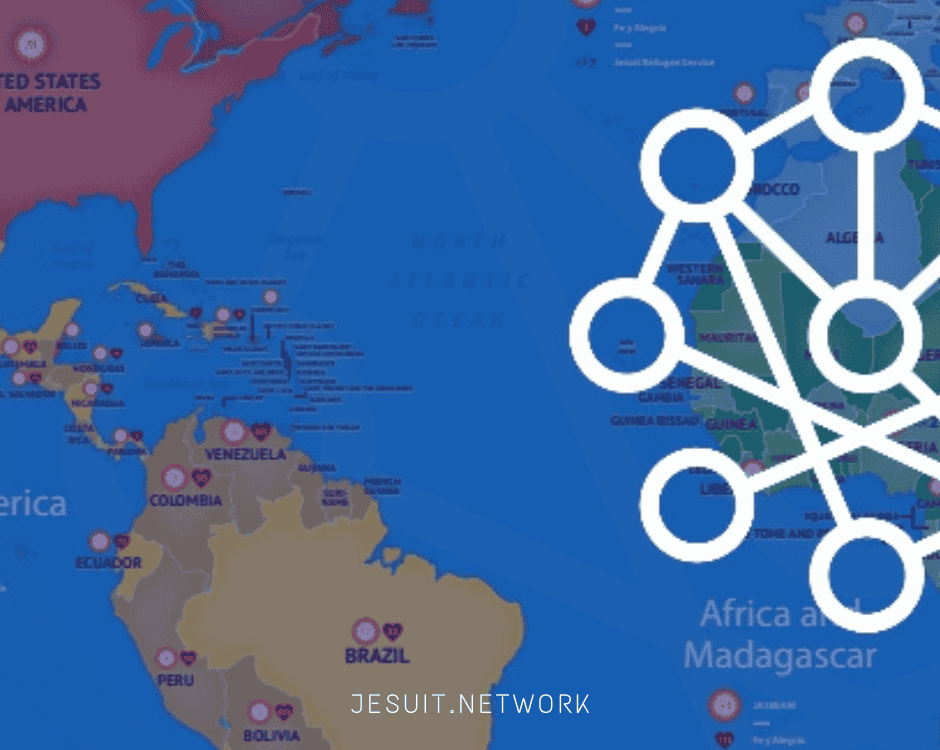[vc_row][vc_column][vc_column_text]
As we close the third day of “Networking for Justice”, we will devote this post to sharing some of the best practices identified by each of our networks.
There were many initiatives that were presented and much knowledge has been shared throughout the day. Of these, we have gathered great lessons that help us to innovate and strengthen our networking for justice. The following is a brief summary of five of them.
1. The Global Ignatian Advocacy Network on Governance of Mineral and Natural Resources shared their work to break the clear link between the extraction of natural resources and armed conflict. To do so, they have focused their activity on promoting the approval of a law at the European level to guarantee the traceability of the chain of mineral coming from conflict zones.
This initiative has been possible thanks to the collaboration between social centers of the Democratic Republic of the Congo with European NGOs and social centers. This initiative has served to maintain the debate on the political agenda, create media pressure, generate visibility and pressure, through discussions carried out in Brussels, to promote legislation that guarantees the traceability of mineral resources. Some legal advances have been achieved in this area at the European level but the challenges continue to be great.
2. The Jesuit Network for Migrants in Latin America is organizing its work through four subregions (1. Central and North America; 2. the Caribbean; 3. Colombia and neighboring countries and 4. South America) corresponding to the flow of forced mobility that characterizes the continent. Today, there are more than 84 Jesuit organizations collaborating.
The main initiative that the network has launched is the Campaign for Hospitality which started in January 2014, after a process of reflection and formulation that has extended throughout 2013. This initiative seeks to promote a culture of respect for human rights of migrants, strengthening the coordination and internal articulation of networking and promote collaboration with other civil society networks and organizations.
3. Since its founding in 2008, the
GIAN for the Right to Education has had the great challenge of creating a network of Jesuit institutions, schools and social institutions dedicated to the right to education. In order to achieve this objective, edujesuit.org was luanched in April 2015 as a tool for communication and participation.
Edujesuit is turning into a very valuable tool in order to show where the Society of Jesus is working to make quality education a reality in contexts of high vulnerability throughout the world. Edujesuit has also contributed to collaboration between other networks such as GIAN Ecology (through Ecojesuit), Educate Magis and Jesuit Networking.
4. The Xavier Network has demonstrated how Jesuit institutions have sought to respond in a coordinated manner when faced with humanitarian emergencies. Starting with the Tsunami in Indonesia, for the last 11 years, the Xavier Network has been coordinating for common action around international humanitarian emergencies. Haiti, Philippines, Nepal… are just some of the 7 emergencies where the Society of Jesus has coordinated humanitarian efforts through the Xavier Network.
Through this best practice we can see some of the clear advantages of networking at the international level. For example, having a single voice for coordination, allowing for a rapid response in a question of days, and accompanying local Jesuit organizations in capacity building and mid-term development efforts. The network approach allows professionalism, transparency and accountability on the use of funds, and has led to increasing impact and visibility of the Xavier Network as one of the biggest humanitarian players in the Jesuit world. They are continuously learning how to improve on this difficult task of being the embodiment of the universal body of the Society of Jesus for solidarity and relief in times of humanitarian emergencies.
5. The Global Ignatian Advocacy Network (GIAN)-Ecology continues to pursue the call to dialogue on sustainability science and values that emerged from previous discussions in Stockholm, Sweden in 2013 and in Bukidnon, Philippines last year. The release of the papal environment encyclical, Laudato si, has made this call for dialogue even more urgent.
It is in this context that the Stockholm Environment Institute, Newman Institute, and GIAN-Ecology are coming together and shaping a common ground to better understand the need to integrate sustainability science and values. The effort is to promote greater engagement and understanding among those doing environmental science and those working with local communities for sustained initiatives on resource management, transformative education, and simple lifestyle.
These are just five of the many best practices that we have shared today, which also include COMPARTE, Xavier Network volunteer group, Honduras-US Advocacy Project, and the Campaign for Education in the Dominican Republic, among others.
[/vc_column_text][vc_raw_html]JTNDc3R5bGUlM0UlMEElMEElMjN0aXRsZSUyQyUyMCUyM2hlYWRlciUyMCUzRSUyMGRpdi5jb250YWluZXIlMjAlN0IlMEFkaXNwbGF5JTNBbm9uZSUzQiUwQSU3RCUwQSUyM25hdmlnYXRpb24lN0IlMEFkaXNwbGF5JTNBbm9uZSUzQiUwQWJvcmRlci1ib3R0b20lM0ElMjAxcHglMjBzb2xpZCUyMCUyM2RkZGRkZCUyMCUyMWltcG9ydGFudCUzQiUwQSU3RCUwQWg0LnRpdHVsZXRlJTIwJTdCJTBBbWFyZ2luLXRvcCUzQTEwcHglMjAlMjFpbXBvcnRhbnQlM0IlMEElN0QlMEFhJTNBaG92ZXIlMjAlN0IlMEFjb2xvciUzQSUyMCUyMzAwODJDOCUyMCUyMWltcG9ydGFudCUzQiUwQSU3RCUwQSUzQSUzQXNlbGVjdGlvbiUyMCU3QiUwQWJhY2tncm91bmQlM0ElMjAlMjMwMDgyQzglMjAlMjFpbXBvcnRhbnQlM0IlMEElN0QlMEFkaXYucG9zdC10aHVtYiUyMCU3QiUwQW1hcmdpbi1ib3R0b20lM0EyMHB4JTNCJTBBJTdEJTBBJTIzdWktaWQtMiUyQyUyMCUyM3VpLWlkLTMlMkMlMjAlMjN1aS1pZC02JTJDJTIwJTIzdWktaWQtOCUyMCU3QiUwQWhlaWdodCUzQWF1dG8lMjAlMjFpbXBvcnRhbnQlM0IlMEElN0QlMEElM0MlMkZzdHlsZSUzRSUwQQ==[/vc_raw_html][/vc_column][/vc_row]





